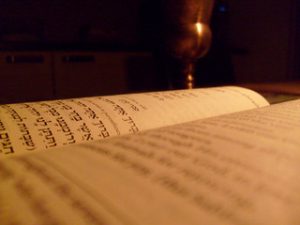These days, people (i.e. parents) often ask me about the utility of Judaic Studies, especially when it comes to finding a job in a rocky economy like ours. In response, I go on and on about the ways in which Judaic Studies hones one’s critical skills, facilitates a multi-disciplinary approach to problem solving and brings to bear a global perspective on the world – qualities that would certainly stand any job-hunting candidate in good stead.

If they’re still listening, I also invoke the work of historian Lucy Dawidowicz who, years ago, published a book with the provocative title, What’s the Use of Jewish History? In it, she cited a story by Y.L. Peretz in which two gentlemen, sitting on a park bench in Warsaw, exchange pleasantries about this and that. As their conversation picks up steam, gentleman number one glumly remarks on the recent passing of Heinrich Graetz, the great German historian of the Jews, seeking some measure of shared consolation. But gentleman number two has nothing to say. Having never heard of Graetz, all he can muster is a feeble, “Was he from around here?”
Dismayed, gentleman number one leaps to Graetz’s defense, extolling his many virtues as an historian, but this, too, does not occasion much of a response. Trying, but failing, to understand why the death of an historian was of any consequence, gentleman number two responds: “Tell me, what is the use of history?”
In telling this tale, Dawidowicz and Peretz before her keenly understood that the study of the Jewish historical experience – of its many languages, literatures and cultures – was an exercise in transmission rather than the pursuit of expediency. When we teach this material, we’re not just filling the air and our students’ notebooks with our collective wisdom; we’re handing it down, much like a precious heirloom or a gift, to a new generation to be safeguarded, sustained and passed on once again.
Our forthcoming Sholem Aleichem Fest, a collaborative venture of GW’s English Department, its Program in Judaic Studies and the Department of Theatre & Dance, is a case in point. A celebration of Sholem Aleichem’s lively and probing imagination through print, film and performance, it will take place over the course of two evenings on April 24th and April 25th.
What makes the Sholem Aleichem Fest particularly moving is the range of its participants who, quite literally, span the generations. At one end of the continuum stands Bel Kaufman, Sholem Aleichem’s granddaughter and a celebrated author in her own right, and Professor Max Ticktin, who has shared his knowledge of and passion for Yiddish literature with the GW community for many, many years. At the other end stands a cluster of theatre students in their late teens and early twenties who are coming to know Sholem Aleichem for the very first time.
You can almost hear Y. L. Peretz, Lucy Dawidowicz and even Sholem Aleichem himself chortling in delight.

